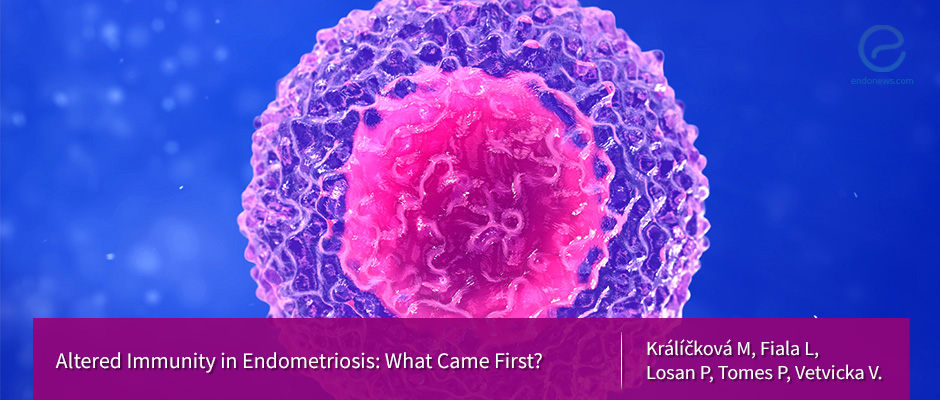Altered Immunity in Endometriosis
Jun 19, 2018
Does immune system regulate endometriosis?
Key Points
Highlight:
- This review article summarizes current knowledge about the immune system and endometriosis, including the involvement of the immune cells macrophages, lymphocytes, and natural killer cells.
Importance:
- Changes in body immune reactions may promote endometriosis. Detailed understanding of immune alterations during endometriosis may help with future therapeutic development.
What's done here:
- The goal of this article is to present scientific data on the possible role of immune system components in endometriosis development.
Data:
- Macrophage numbers are elevated inside the peritoneal cavity of patients with endometriosis and may be involved in endometriosis through affecting angiogenesis.
- Low ratios of T helper 1 to T helper 2 lymphocytes (Th1 to Th2) localized within the ectopic tissue may contribute to cell growth.
- Several cytokines such as COX-2, IL-1β, IL-8, IL-6, and TNF-α promote implantation of the ectopic endometrium and its growth through proliferation and angiogenesis.
Lay Summary
In recent years, there has been increased attention on the role of immune system in endometriosis development. Normally, immune reactions are supposed to destroy endometrial cells seeding in the peritoneal cavity. Nonetheless, in endometriosis, these cells are able to evade, penetrate, proliferate and ultimately are forming lesions. Persistent inflammatory response within peritoneal cavity causing vasodilation and increased permeability of blood vessels contributing to initial endometrial growth. Thus, changes in cell-mediated and humoral immunity may contribute to pathogenesis endometriosis.
This review article by Králíčková et al. published from Department of Histology and Embryology, Charles University, Plzen, the Czech Republic in Immunological Investigations discusses recent literature on the role of immune cells and components in endometriosis development. Immune cells discussed include macrophages and lymphocytes such as T cells and natural killer cells.
Macrophages are primary defense cells within our body and the peritoneal cavity through phagocytosis and supporting cytokine secretion. During acute inflammation, resident macrophages are responsible for changes in blood flow and the transfer of cells into the tissue site. A subset of macrophages may promote endometriosis by contributing to angiogenesis.
Lymphocytes localized within the endometrial ectopic tissue may contribute to lesion growth through low ratios of T helper cells 1 to T helper cells 2 activity. These cells “help” regulation of other immune cells by releasing T cell cytokines. Current studies have focused on the role of Tregs cells, which can be expanded and activated by the high level of estradiol in endometriosis. A specific subset of Tregs, known as Th17 cells may be involved in endometriosis.
Natural Killer (NK) cells are large granular lymphocytes representing approximately 10% of peripheral blood lymphocytes and are often suggested to be involved in endometriosis. The increased mature KIR(+) NK cells in peripheral blood may increase risk factor for endometriosis. Activated NK cells can infiltrate the endometriotic lesions, suggesting their potential role.
Further to these immune cells, cytokines such as COX-2, IL-1β, IL-8, IL-6, and TNF-α are often considered in the pathophysiology of endometriosis. These cytokines secreted by immune or endometrial cells may promote implantation and growth of ectopic endometrium via proliferation and angiogenesis. In chronically inflamed peritoneum, extracellular matrix-modifying enzymes and inflammatory cells also affect the dissemination of ectopic cells and their attachment to the serosa. "Current knowledge on factors involved is not clear" add authors.
In conclusion, current data showed changes in immune cell numbers and activities within the endometrium and peritoneal cavity; however, the involvement of immune system remain elusive. It is yet unclear whether the changes in the immune system represent contributing factors or consequences of endometriosis.
Research Source: https://www.ncbi.nlm.nih.gov/pubmed/?term=29873595
immune system inflammation macrophages Treg helper T cells proliferation angiogenesis. implantation peritoneal cavity

